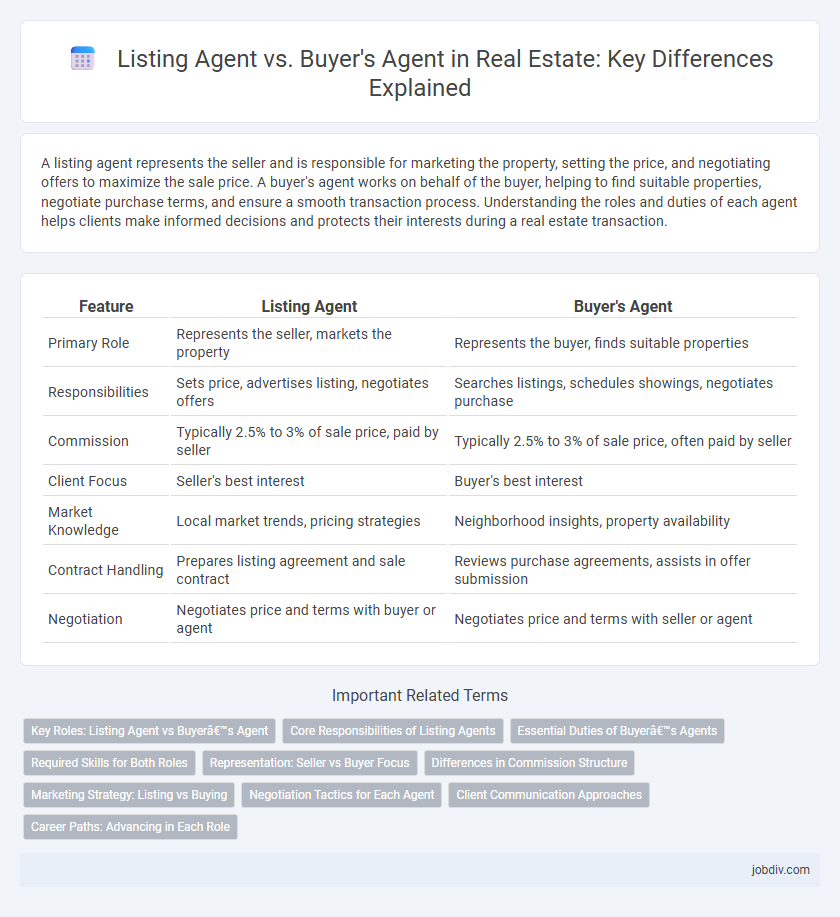A listing agent represents the seller and is responsible for marketing the property, setting the price, and negotiating offers to maximize the sale price. A buyer's agent works on behalf of the buyer, helping to find suitable properties, negotiate purchase terms, and ensure a smooth transaction process. Understanding the roles and duties of each agent helps clients make informed decisions and protects their interests during a real estate transaction.
Table of Comparison
| Feature | Listing Agent | Buyer's Agent |
|---|---|---|
| Primary Role | Represents the seller, markets the property | Represents the buyer, finds suitable properties |
| Responsibilities | Sets price, advertises listing, negotiates offers | Searches listings, schedules showings, negotiates purchase |
| Commission | Typically 2.5% to 3% of sale price, paid by seller | Typically 2.5% to 3% of sale price, often paid by seller |
| Client Focus | Seller's best interest | Buyer's best interest |
| Market Knowledge | Local market trends, pricing strategies | Neighborhood insights, property availability |
| Contract Handling | Prepares listing agreement and sale contract | Reviews purchase agreements, assists in offer submission |
| Negotiation | Negotiates price and terms with buyer or agent | Negotiates price and terms with seller or agent |
Key Roles: Listing Agent vs Buyer’s Agent
Listing agents represent sellers by marketing properties, setting competitive prices, and negotiating offers to maximize sales value. Buyer's agents assist buyers by identifying suitable properties, conducting market analysis, and advocating for favorable purchase terms. Both agents play crucial roles in facilitating successful real estate transactions through specialized expertise and client representation.
Core Responsibilities of Listing Agents
Listing agents primarily represent the seller by marketing the property, pricing it competitively, and negotiating offers to maximize the seller's return. They coordinate home showings, manage disclosures, and ensure compliance with local real estate laws throughout the transaction. Their expertise in market analysis and strategic promotion plays a critical role in achieving a successful and timely sale.
Essential Duties of Buyer’s Agents
Buyer's agents play a crucial role in guiding clients through property searches, negotiations, and contract reviews to secure the best possible deal. They conduct market analysis to identify suitable homes that meet the buyer's criteria and budget while ensuring compliance with legal and financial requirements. Their negotiating expertise and fiduciary responsibility protect the buyer's interests throughout the transaction, making them indispensable in the home-buying process.
Required Skills for Both Roles
Listing agents excel in market analysis, negotiation, and marketing strategies to attract potential sellers and maximize property exposure. Buyer's agents demonstrate expertise in property search, client needs assessment, and due diligence to secure optimal purchase terms. Both roles demand strong communication, local market knowledge, and legal compliance to ensure seamless transaction processes.
Representation: Seller vs Buyer Focus
A listing agent exclusively represents the seller, marketing the property to maximize exposure and negotiate offers on behalf of the seller. A buyer's agent works solely for the buyer, identifying suitable properties, conducting market analysis, and negotiating purchase terms to protect the buyer's interests. Representation clarity ensures each agent advocates for their client's specific goals in the real estate transaction.
Differences in Commission Structure
Listing agents typically receive a commission paid by the seller, often around 5-6% of the home's sale price, which is then split with the buyer's agent. Buyer's agents earn their commission from the seller's payout, sharing the total fee with the listing agent, aligning their compensation with the successful closing of the transaction. The commission split structure incentivizes both agents to facilitate a smooth sale, but listing agents usually have a direct agreement with the seller, while buyer's agents represent the purchaser's interests.
Marketing Strategy: Listing vs Buying
Listing agents employ targeted marketing strategies such as professional photography, virtual tours, and multiple listing service (MLS) exposure to attract potential buyers and maximize property visibility. Buyer's agents focus on personalized market analysis, property notifications, and negotiation skills to secure the best purchase terms for clients. Effective collaboration between listing and buyer's agents enhances transaction efficiency and client satisfaction in competitive real estate markets.
Negotiation Tactics for Each Agent
Listing agents leverage market data and property comparables to justify pricing and counteroffer strategies, aiming to maximize the seller's profit while maintaining buyer interest. Buyer's agents utilize detailed knowledge of buyer needs and local market trends to craft compelling offers, often requesting contingencies or concessions to protect the buyer's interests. Both agents employ negotiation tactics such as deadline pressure, escalation clauses, and communication of competing offers to influence terms favorable to their clients.
Client Communication Approaches
Listing agents prioritize clear, frequent updates to sellers about market activity and feedback from showings to maximize property exposure. Buyer's agents focus on understanding client preferences and providing tailored property options while maintaining open communication to negotiate effectively. Effective client communication in real estate hinges on transparency, responsiveness, and proactive information sharing tailored to each party's needs.
Career Paths: Advancing in Each Role
Listing agents often advance by building a strong reputation in local markets, specializing in luxury properties, and developing skills in marketing and negotiation to attract sellers. Buyer's agents progress by deepening client relationships, expanding knowledge of neighborhoods, and enhancing expertise in financing options to better support buyers. Career growth in both roles benefits from networking, certifications like CRS or ABR, and adapting to technology-driven market trends.
Listing Agent vs Buyer’s Agent Infographic

 jobdiv.com
jobdiv.com